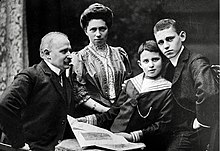Carl Zuckmayer (entrepreneur)
Carl Zuckmayer (born April 26, 1864 in Laubenheim , Grand Duchy of Hesse ; † December 12, 1947 in Oberstdorf , Bavaria ) was a German entrepreneur . He was a brother of the politician Joseph Zuckmayer .
family
Zuckmayer was born as the son of the Mainz Justice Council (lawyer) Jacob Josephus Zuckmayer (1837-1916) and his wife Klara Thekla Zuckmayer (born July 29, 1842), born Berninger, from Mainz, into a Roman Catholic family in Laubenheim , now part of the city Mainz, born. On June 30, 1888, he married Amalie Friederike Auguste Goldschmidt (1869–1954), who was born in Mainz and was of Jewish origin, but evangelical-Lutheran. Her father was the merchant and church councilor Eduard Goldschmidt († 1919) from Bingen am Rhein , her mother Rosalia Goldschmidt, née Canstadt, from Mainz.
Carl and Amalie Zuckmayer had two sons, the later composer, conductor, concert pianist and music teacher Eduard Zuckmayer in 1890 and the later writer Carl Zuckmayer in 1896 . Both were baptized and raised Catholics. The household of the wealthy family was supported by a housemaid; House music was a natural part of family life. Amalie Zuckmayer played the piano, Carl Zuckmayer sen. sang, Eduard learned to play the piano, Carl jun. the cello, but later preferred the guitar. A statement from Carl jun. Reported: “I know that with the following sentence I violate all literary conventions, that I expose myself to suspicion of whitewashing, banality, and even the damning accusation of 'cliché', but I'll tell you: I have a happy one Had childhood. I know you don't like to hear that and it's a bold claim, but anything else would be a lie ”.
development
Carl Zuckmayer Sr. has been running the bottle cap factory in Nackenheim since October 29, 1887, which was founded in 1868 by the Mainz businessman Franz Frenay, which he acquired at the age of 23 for little capital and which he subsequently modernized. Originally driven by a mill wheel, production was first switched to the support of a steam engine and finally to an electric motor . For this purpose, Zuckmayer hired additional workers, with whom he had an affectionate relationship. His wife, who already had power of attorney in the company at the age of 18 from August 1, 1888 , was the first in the region to set up company health advice, especially for female employees, and voluntary health insurance . The Zuckmayers became the largest employers in the region. Shortly before the turn of the century, Carl Zuckmayer's poor eyesight increased in a way that no longer allowed him to continue running the business. He therefore changed the company to the Nackenheimer Metallkapseln- und Kellereimaschinenfabrik AG stock corporation. Karl Voltz Nachf. Um, was supported by his co-partners, the banker Felix Goldschmidt from Mainz, who was related to his wife, the Frankfurt-based and related merchants Alfred Salin (1859-1948) and Ludwig Schiff (1854-1930) as well as the Resident engineer Moritz Heinrich Boninger was designated the sole member of the board, while the other co-shareholders formed the supervisory board. Carl Zuckmayer moved with his family to Mainz in 1900 , and on January 18, 1907, he resigned from the board. However, he continued to hold shares in the company with a nominal value of 100,000 gold marks . The company released 10 million capsules a month, became the largest European manufacturer of tinfoil capsules and exported most of its production worldwide.
The market leader that emerged from Zuckmayer's wine capsule factory , Vereinigte Kapselfabriken Nackenheim GmbH (VKN), which traded as such from 1952 , had around 425 employees in the mid-1960s, and around 100 in 2009.
Amalie Zuckmayer was considered a “full Jew” (NS diction) during the Nazi era , but survived due to her marriage (“mixed marriage” according to NS diction) with a husband who was considered “Aryan” (NS diction).
Carl Zuckmayer Sr. died at the age of 83 in the Allgäu.
Individual evidence
- ↑ Assumptions that it could be Laubenheim an der Nahe are with a view to the family history with a probability bordering on certainty wrong, s. in addition z. B. [1] and [2]
- ^ A b Anne-Gabriele Michaelis: The world of poetry for curious readers . Volume 9: Bertolt Brecht, Carl Zuckmayer, Gerhart Hauptmann, Karl-Heinrich-Waggerl . Engelsdorfer Verlag, Leipzig 2016. ISBN 978-3-96008-388-7 .
- ↑ Gerhard Prause: Geniuses in School. Legend and truth. Einstein, Freud, Marx, Nietzsche, Luther, Kafka, Darwin, Schiller and 100 others . LIT Verlag, Münster 2007. ISBN 3-8258-0105-5 , p. 105.
- ↑ Nackenheimer Weinkapseln - market leader is broke . In: ntv, May 7, 2009. On: n-tv.de
- ↑ a b c United capsule factories Nackenheim . In: Hessisches Wirtschaftsarchiv. On: hessischeswirtschaftsarchiv.de
- ↑ Carl Zuckmayer and the Nackenheimers . On: nackenheim.de
- ↑ New permanent presentation planned for the Zuckmayer family in Nackenheim . In: Allgemeine Zeitung, March 22, 2017. At: Allgemeine-zeitung.de
- ↑ Salin, Alfred . In: German biography. On: deutsche-biographie.de
- ^ Wilhelm Kosch: Deutsches Theater-Lexikon , Volume 38: Zedler – Zysset . Walter de Gruyter, Berlin 2011. ISBN 978-3-11026-901-7 , p. 3870.
- ↑ Zuckmayer's capsule works for wine bottles broke . In: Rhein-Zeitung, May 7th 2009. On: rhein-zeitung.de
- ↑ The future of the capsule factory in Nackenheim is still unclear . In: Allgemeine Zeitung, December 29, 2015. At: Allgemeine-zeitung.de
- ^ Eduard Zuckmayer . In: Lexicon of persecuted musicians from the Nazi era (LexM), Institute for Historical Musicology at the University of Hamburg. On: uni-hamburg.de
| personal data | |
|---|---|
| SURNAME | Zuckmayer, Carl |
| ALTERNATIVE NAMES | Zuckmayer, Karl |
| BRIEF DESCRIPTION | German entrepreneur |
| DATE OF BIRTH | April 26, 1864 |
| PLACE OF BIRTH | Laubenheim , Rhineland-Palatinate |
| DATE OF DEATH | December 12, 1947 |
| Place of death | Oberstdorf , Bavaria |
